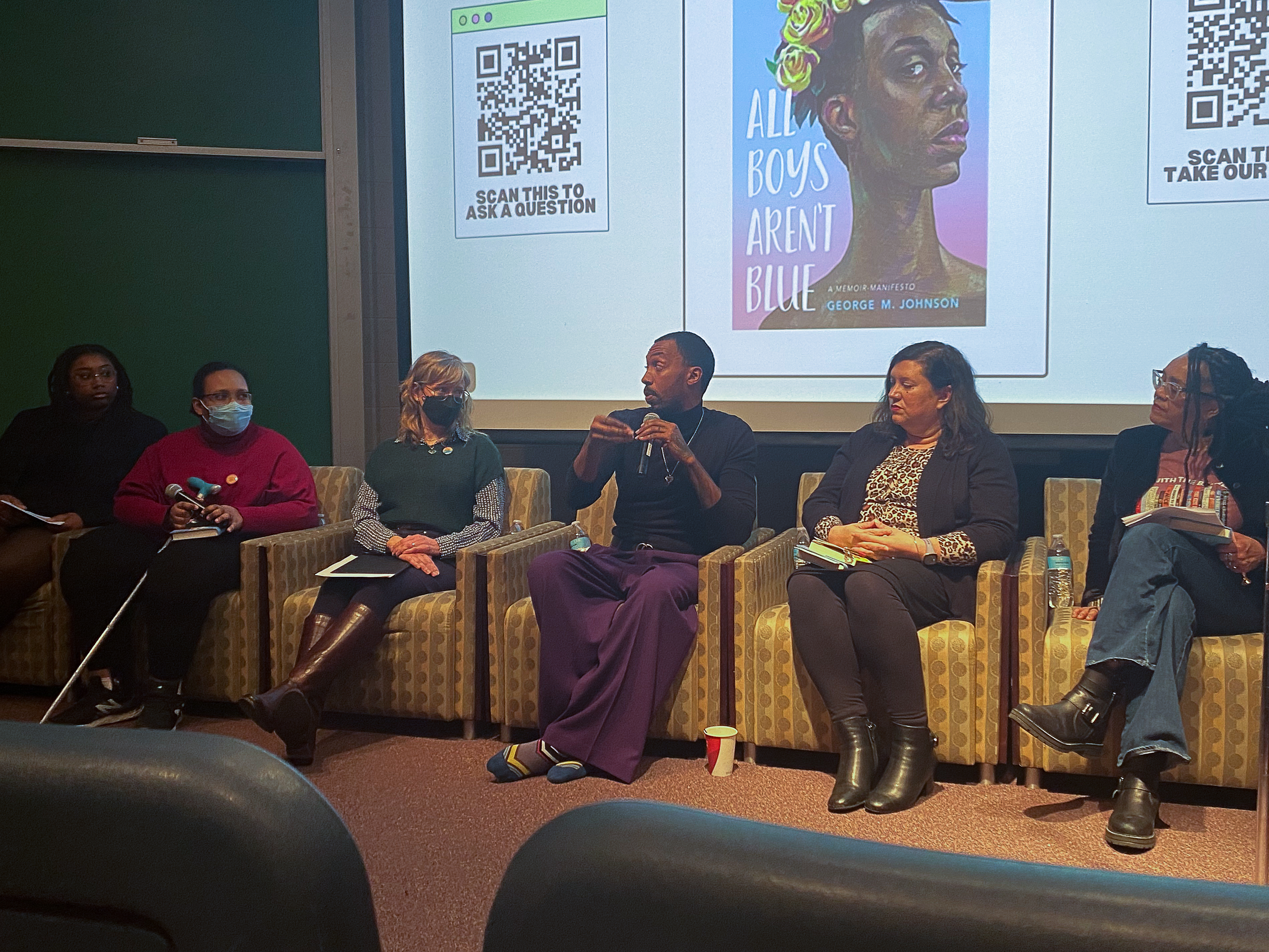On March 2 visitors gathered in Room 154 of DePaul’s Schmitt Academic Center to welcome the award-winning Black nonbinary author, activist and journalist George M. Johnson to present their New York Times best-selling debut All Boys Aren’t Blue: A Memoir-Manifesto.
According to data from The American Library Association, Johnson’s book has been banned in nearly 21 states across the U.S., becoming one of the most banned books in the country, sitting at number 3 on the list of The Top Ten Most Challenged Books of 2021.
Johnson joined DePaul students, faculty and visitors to discuss why they wrote the book as well as share an excerpt from the book. This event was hosted by DePaul’s LGBTQ+ Studies Program in partnership with the Department of English, and co-hosted by many other DePaul programs, colleges and centers.This event is also supported by a Diversity and Inclusion Initiative Grant (DIIG) from the Office of Academic Affairs and a Vincentian Endowment Fund Discretionary Grant from the Division of Mission and Ministry.
All Boys Aren’t Blue is Johnson’s autobiography that explores their life as a young African American queer boy in New Jersey and Virginia during the early 1990s. Johnson expresses sincere vulnerability and honesty that places the spotlight on an audience and dynamic that most times goes overlooked in the media, with a focus on not only Black queerness but exploring the Black family dynamic within that. Johnson exclaimed the importance for them to showcase Blackness in its totality for their readers who often don’t get these portrayals.
“When I’m writing about the Black family, I want to write about us in totality, in a way the media has never allowed us to be. We’ve always been one-dimensional, and we are fully human and we make mistakes, but we are also great, and that’s how I always want to depict the Black family dynamic,” Johnson said.
During the event Johnson read an excerpt from Chapter 6 of their book titled, “You Can’t Swim in Cowboy Boots.” In this chapter Johnson transports readers to California during summer of 1992 as a young Johnson is set to visit their grandmother for vacation. Johnson recalls how that trip remains special to them.
“Heading to California remains one of my best memories because it was where my true bond with nanny began,” said Johnson. Johnson’s bond with their grandmother proves to be important as they went on to express, “While out there she decided that she was going to buy us all new sneakers before we went to Disneyland the next day.”
Johnson proceeded to talk about how, as they walked through the store, they realized they weren’t interested in sneakers. Their grandmother took the time to ask this question:
“What is it you want, then?”
To that, Johnson responded, “Cowboy boots.”
Johnson talked about how their cousins began to look at them and question why they didn’t want the hottest brand out at the time. Despite the flurry of questions, Johnson’s grandmother affirmed them and made the effort to ensure that Johnson got the cowboy boots they wanted so desperately. The significance of this event affirmed Johnson’s realization of themselves.
They describe the boots as follows: “The silver tip was so shiny you could see your reflection in them. They were odd but they matched me. They stood out and allowed me to express the parts of me that were different. I fought hard to fit in, but my spirit fought harder to be out.”

Black non-binary author, activist and journalist George Johnson discusses their book, All Boys Aren’t Blue, with a panel at the Schmitt Academic Center on March 2. Photo by Monique Petty-Ashmeade, 14 East
Thirty years later, Johnson’s fighting spirit remains vibrant. Johnson’s book and public response to it sets the framework for an important conversation around the challenging of literature—to simply put it, what is known as book-banning.
According to the American Association of Literature, book banning and challenging are broken down into this definition:
“A challenge is an attempt to remove or restrict materials, based upon the objections of a person or group. A banning is the removal of those materials. Challenges do not simply involve a person expressing a point of view; rather, they are an attempt to remove material from the curriculum or library, thereby restricting the access of others. Due to the commitment of librarians, teachers, parents, students and other concerned citizens, most challenges are unsuccessful and most materials are retained in the school curriculum or library collection.”
During 2022, there were 729 attempts to challenge or ban a total 1,597 books from January to October. During that year Johnson served as the Chair for Banned Books Week for its 40th Anniversary.
As the night went on Johnson was joined on stage for a panel featuring Assistant Professor of DePaul’s Women and Gender Studies Department Heather Montes Ireland; and Heather Jagman, who serves as the 2022-23 President of the Illinois Library Association and coordinator of research, instruction, and academic engagement at DePaul’s Library, as well as liaison to the Theatre School and College of Education. Also on the panel was Macky Sahleu, a second-year undergraduate student and staff at the LGBTQIA+ Resource Center; and Lauren Roundtree, a master’s student in Women and Gender Studies.
The conversation around book-banning causes one to look at the relationship that librarians have to the public as well as who gets a seat at the table to share their stories and experiences. Johnson shared their experience with librarians during the time of their book banning.
When the book ban began for Johnson’s work, they expressed that librarians were at the forefront of attack. Receiving contact from librarians originally locally, Johnson began to track what was happening with their work. With Johnson’s background in journalism, they were able to utilize their voice via social media to bring attention to what was happening.
“Librarians really, really championed my book. They were super excited to have a title for young adults, because librarians are, one, superheroes, I always say, but two, they’re therapists. They are at that front counter. They are right there when that queer teen comes in looking for something and librarians always want to have something to offer,” Johnson said.
Johnson shares that it boils down to more than simply picking a book. There is a matter of representation that is at hand.
“It’s not just about picking books, it’s about the fact that they know that the people that they see sometimes, the only resource or the only way they can see themselves is in a book. Librarians fight hard to make sure that they can have a reflection of everyone that enters those doors.”
Books have the ability to transport readers into different worlds and lives of others. It is the expansion of knowledge within a diverse society. Johnson explained how books and education can build solidarity.
“We gotta know about the people who exist around us. Books are bridges that build empathy … they let you enter someone else’s world through their lens, through their eyes, and have to take a walk or journey in their shoes for that day. It allows you to expand your mind to realize that you have been in a bubble.”
When book banning occurs, it prohibits us from stepping outside of that bubble and into the worldview of others.
“All Boys Aren’t Blue does several things, but the one thing it does is teaches how you have been an oppressor in somebody else’s life and maybe didn’t know it, and it gives you tools on how to go about now navigating people’s lives that you may be the oppressor in. People are afraid to be called out. We’re not trying to call you out, we’re trying to call you in,” said Johnson.
Despite the continuous banning of Johnson’s book, at its core the function of All Boys Aren’t Blue provides the agency to call people in.
Header Graphic by Annie Gidionsen




NO COMMENT